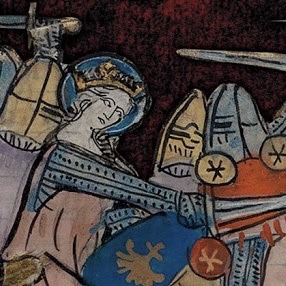#Queen Matilda
Text
Robert Curthose: The Valiant Duke and Dynastic Struggles of Medieval Normandy and England!
Robert Curthose (1051-1134) was a Norman duke, son of William the Conqueror. Despite his valiant role in battles like Tinchebray, he lacked political finesse, losing the English throne to his brother, Henry I. Exiled for his rebellion, robert curthose history spent his later years imprisoned. His life reflects both the martial prowess and dynastic struggles of medieval Normandy and England.

#Robert Curthose history#william the conqueror#king richard of england#richard the lionheart#robert the wayward prince#queen matilda#eleanor of aquitaine#civil war in england#king john#wars of the magna carta
0 notes
Text
17th September
Pig’s Face Feast

Source: Charlotte Bellamy Photography
On the Sunday after 14th September (today in 2023), the Pig’s Face Feast is held at Avening, near Stroud, in Gloucestershire. It was first held in 1080 as an act of contrition by Queen Matilda, wife of William I who, before the Norman Conquest, when she was merely Lady Matilda, developed a passion for Byrhtric, Lord of Gloucester. The married Byrhtric rebuffed her advances and the infuriated Matilda, once she became Queen of England, dispossessed the unfortunate man of his lands and had him flung into a dungeon where he soon died. Filled with guilt and remorse, Matilda later endowed the church at Avening and decreed a boar’s head feast should be held there every mid-September in honour of Byrhtric and to demonstrate the queen’s repentance. The feast so caught the imagination of the locals that they kept it going for centuries after Matilda’s death. It is re-enacted every other year with a mock eleventh century pig’s head banquet, medieval music and Pig’s Head sandwiches, served in the local pubs. I’m sure the deceased Byrhtric appreciated the gesture.
0 notes
Text
The Amazing Readathon Week Two
The Amazing Readathon is a readathon created by Brianna from Four Paws and a Book and co-hosted by many others in the BookTube and Bookstagram community. This one is based on the reality TV show The Amazing Race and it’s about spending the month of August travelling the world. There are prompts and ways you can get bonus points (team colour, BIPOC author, etc.). It turns out that we’re not…

View On WordPress
#Agatha Christie#Biography#Books#Eleanor Shearer#Elizabeth Chadwick#England#English History#Francis Walsingham#Henry I#Historical Fiction#Historical Thriller#History#King Stephen#Margaret Owen#Medieval#Mystery#Nancy Goldstone#Queen Matilda#The Amazing Readathon#Thriller
0 notes
Audio
(Peacock's Tale folk indie duo)
#SoundCloud#music#Peacock's Tale folk indie duo#Geoffrey de Mandeville#Burwell#Queen Matilda#The Empress Matilda#world book day
1 note
·
View note
Text








House of the Dragon’s Historical Inspiration
╰─▸ The Anarchy (1138 - 1153) was a civil war that broke out in England when Stephen of Blois seized the throne after his uncle Henry I’s death. Henry I’s heir apparent, his daughter Empress Matilda, traveled to England and waged war against her cousin with the help of her uncle, King David of Scotland. Though Matilda’s army captured Stephen, she was never officially crowned and the war entered a stalemate. Stephen was released on the agreement that after his reign, Matilda’s sons and not his own would gain the throne, thus ending the feud.
#weloveperioddrama#historicwomendaily#hotd#house of the dragon#rhaenyra targaryen#empress matilda#daemon targaryen#king David I of Scotland#viserys targaryen#king Henry I#alicent hightower#Queen Adeliza#otto hightower#Stephen of blois#aegon ii targaryen#aemond targaryen#haelena targaryen#hotd edit#my aesthetic posts#the anarchy#english history#royal history
385 notes
·
View notes
Text
A central element of the myth of [Eleanor of Aquitaine] is that of her exceptionalism. Historians and Eleanor biographers have tended to take literally Richard of Devizes’s conventional panegyric of her as ‘an incomparable woman’ [and] a woman out of her time. […] Amazement at Eleanor’s power and independence is born from a presentism that assumes generally that the Middle Ages were a backward age, and specifically that medieval women were all downtrodden and marginalized. Eleanor’s career can, from such a perspective, only be explained by assuming that she was an exception who rose by sheer force of personality above the restrictions placed upon twelfth-century women.
-Michael R. Evans, Inventing Eleanor: The Medieval and Post-Medieval Image of Eleanor of Aquitaine
"...The idea of Eleanor’s exceptionalism rests on an assumption that women of her age were powerless. On the contrary, in Western Europe before the twelfth century there were ‘no really effective barriers to the capacity of women to exercise power; they appear as military leaders, judges, castellans, controllers of property’. […] In an important article published in 1992, Jane Martindale sought to locate Eleanor in context, stripping away much of the conjecture that had grown up around her, and returning to primary sources, including her charters. Martindale also demonstrated how Eleanor was not out of the ordinary for a twelfth-century queen either in the extent of her power or in the criticisms levelled against her.
If we look at Eleanor’s predecessors as Anglo-Norman queens of England, we find many examples of women wielding political power. Matilda of Flanders (wife of William the Conqueror) acted as regent in Normandy during his frequent absences in England following the Conquest, and [the first wife of Henry I, Matilda of Scotland, played some role in governing England during her husband's absences], while during the civil war of Stephen’s reign Matilda of Boulogne led the fight for a time on behalf of her royal husband, who had been captured by the forces of the empress. And if we wish to seek a rebel woman, we need look no further than Juliana, illegitimate daughter of Henry I, who attempted to assassinate him with a crossbow, or Adèle of Champagne, the third wife of Louis VII, who ‘[a]t the moment when Henry II held Eleanor of Aquitaine in jail for her revolt … led a revolt with her brothers against her son, Philip II'.
Eleanor is, therefore, less the exception than the rule – albeit an extreme example of that rule. This can be illustrated by comparing her with a twelfth century woman who has attracted less literary and historical attention. Adela of Blois died in 1137, the year of Eleanor’s marriage to Louis VII. […] The chronicle and charter evidence reveals Adela to have ‘legitimately exercised the powers of comital lordship’ in the domains of Blois-Champagne, both in consort with her husband and alone during his absence on crusade and after his death. […] There was, however, nothing atypical about the nature of Adela’s power. In the words of her biographer Kimberley LoPrete, ‘while the extent of Adela’s powers and the political impact of her actions were exceptional for a woman of her day (and indeed for most men), the sources of her powers and the activities she engaged in were not fundamentally different from those of other women of lordly rank’. These words could equally apply to Eleanor; the extent of her power, as heiress to the richest lordship in France, wife of two kings and mother of two or three more, was remarkable, but the nature of her power was not exceptional. Other noble or royal women governed, arranged marriages and alliances, and were patrons of the church. Eleanor represents one end of a continuum, not an isolated outlier."
#It had to be said!#eleanor of aquitaine#historicwomendaily#angevins#my post#12th century#gender tag#adela of blois#I think Eleanor's prominent role as dowager queen during her sons' reigns may have contributed to her image of exceptionalism#Especially since she ended up overshadowing both her sons' wives (Berengaria of Navarre and Isabella of Angouleme)#But once again if we examine Eleanor in the context of her predecessors and contemporaries there was nothing exceptional about her role#Anglo-Saxon consorts before the Norman Conquest (Eadgifu; Aelfthryth; Emma of Normandy) were very prominent during their sons' reigns#Post-Norman queens were initially never kings' mothers because of the circumstances (Matilda of Flanders; Edith-Matilda; and#Matilda of Boulogne all predeceased their husbands; Adeliza of Louvain never had any royal children)#But Eleanor's mother-in-law Empress Matilda was very powerful and acted as regent of Normandy during Henry I's reign#Which was a particularly important precedent because Matilda's son - like Eleanor's sons after him - was an *adult* when he became King.#and in France Louis VII's mother Adelaide of Maurienne was certainly very powerful and prominent during Eleanor's own queenship#Eleanor's daughter Joan's mother-in-law Margaret of Navarre had also been a very powerful regent of Sicily#(etc etc)#So yeah - in itself I don't think Eleanor's central role during her own sons' reigns is particularly surprising or 'exceptional'#Its impact may have been but her role in itself was more or less the norm
355 notes
·
View notes
Text

Matilda, Eleanor, and Joanna - retrospring request for the Angevin daughters
#Angevin empire#Plantagenets#Matilda of Saxony#Eleanor of England queen of Castile#Joanna of Sicily#12th century#medieval#medieval women#requests#my art
158 notes
·
View notes
Text


Empress Matilda — Rhaenyra’s Historical Parallel
“We can think of Empress Matilda as the fierce nearly Norman queen, who battled her cousin Stephen and the sexism of medieval England for 19 long years, during a period described as ‘The Anarchy’. Basing her campaign in Oxford, Matilda battled, sieged, and even made an elaborate escape during her enduring efforts to claim the English throne.
Matilda would have been the first English Queen to rule in her own right, had she been crowned in 1141. She was the first woman to be named as heir to the English throne and she fought fiercely for her succession. As it happened, England wouldn’t see a queen for another 400 years.” — Museum of Oxford
#rhaenyra targaryen#the realms delight#the dragon queen#history#empress matilda#hotd#house of the dragon#fire and blood#team black#pro team black#aegon ii#anti team green
110 notes
·
View notes
Text
I think that nice librarian lady should ALSO adopt Matilda. librarian and miss honey should get married
#matilda#matilda the musical#matilda wormwood#miss honey#molly mumbles#librarian queen I dont remember your name but you deserve it
724 notes
·
View notes
Text
Royal Reads: Apr-Jun 2024
Note: Some of the following links are affiliate links, which means I earn a commission on every purchase. This does not affect the price you pay.


George VI and Elizabeth: The Marriage That Shaped the Monarchy by Sally Bedell Smith (new paperback version published Apr. 11, 2024) // Heroines of the Tudor World by Sharon Bennett Connolly (Jun. 15, 2024)



Six Lives: The Stories of Henry VIII's Queens by Charlotte Bolland, Suzannah Lipscomb, Nicola Clarke, Brett Dolman, Alden Gregory, Benjamin Hebbert, Nicola Tallis, Valerie Schutte (Jun. 20, 2024) // Revenge: Meghan, Harry, and the War Between the Windsors by Tom Bower (new paperback version published Apr. 16, 2024) // The Private Life of James II by Justine Ruth Brown (May 30, 2024)


The Waiting Game: The Untold Story of the Women Who Served the Tudor Queens by Nicola Clark (Apr. 25, 2024) // James VI, Britannic Prince: King of Scots and Elizabeth's Heir, 1566-1603 by Alexander Courtney (Jun. 3, 2024)



Wise Words from King Charles III by Karen Dolby (Apr. 25, 2024) // Hunting the Falcon: Henry VIII, Anne Boleyn and the Marriage That Shook Europe by John Guy, Julia Fox (new paperback version published Jun. 6, 2024) // Herod the Great: Jewish King in a Roman World by Martin Goodman (May 14, 2024)



Rasputin's Killer and his Romanov Princess by Coryne Hall (Jun. 15, 2024) // Catherine de' Medici: The Life and Times of the Serpent Queen by Mary Hollingsworth (Jun. 6, 2024) // Power and Glory: Elizabeth II and the Rebirth of Royalty by Alexander Larman (new hardcover published Apr. 30, 2024)



Stephen and Matilda's Civil War: Cousins of Anarchy by Matthew Lewis (May 30, 2024) // Courting the Virgin Queen: Queen Elizabeth I And Her Suitors by Carol Ann Lloyd (Jun. 30, 2024) // Babur: The Chessboard King by Aabhas Maldahiyar (Jun. 27, 2024)


Lady Charlotte Guest: The Exceptional Life of a Female Industrialist by Victoria Owens (Jun. 30, 2024) // Thorns, Lust and Glory: The betrayal of Anne Boleyn by Estelle Paranque (May 2, 2024)


The Palace: From the Tudors to the Windsors, 500 Years of Royal History at Hampton Court by Gareth Russell (new paperback version published May 9, 2024) // The Lost Queen: The Surprising Life of Catherine of Braganza, Britain’s Forgotten Monarch by Sophie Shorland (Jun. 6, 2024)



The Royal Palaces: Secrets and Scandals by Kate Williams, James Oses (Jun. 27, 2024) // The Mysterious Death of Katherine Parr: What Really Happened to Henry VIII's Last Queen? by June Woolerton (Apr. 4, 2024) // Izabela the Valiant: The Story of an Indomitable Polish Princess by Adam Zamoyski (Jun. 20, 2024)
#literature#affiliate links#royal history#king george vi#queen elizabeth the queen mother#king james vii and ii#king james vi and i#king charles iii#king henry viii#anne boleyn#prince felix yusupov#princess irina alexandrovna#catherine de medici#queen elizabeth ii#empress matilda#king stephen#queen elizabeth i#lady charlotte guest#hampton court#queen catherine#catherine parr
30 notes
·
View notes
Text
Robert Curthose: The Overlooked Duke of Normandy
Robert Curthose, also known as Robert II of Normandy, is a figure whose legacy often stands in the shadows of his more famous father, William the Conqueror, and his younger brothers, William II and Henry I of England. Born around 1051, Robert Curthose was the eldest son of William the Conqueror and Matilda of Flanders. Despite his noble birth and the significant role he played in the turbulent history of Normandy and England, Robert's story is one of ambition, rivalry, and ultimately, a fall from grace.

Early Life and Ambitions
From an early age, Robert displayed the courage and leadership expected of a future ruler. He earned the nickname "Curthose" due to his short stature, with "Curthose" literally meaning "short stockings." However, Robert’s ambitions were anything but short. He was eager to prove himself and sought to assert his independence, often clashing with his father over his desire for power and control.
Conflict with His Father and Brothers
The relationship between Robert and his father, William the Conqueror, was fraught with tension. In 1077, Robert led a rebellion against his father, demanding control over Normandy. The rebellion was unsuccessful, but it marked the beginning of a long-standing feud within the family. Things only got worse after William's death in 1087. Robert was granted the Duchy of Normandy, while his younger brother, William Rufus, inherited the English crown. This division of power sowed seeds of discord between the brothers, leading to several conflicts over control of both England and Normandy.
The Battle for Power
Robert’s rivalry with his brothers was marked by a series of power struggles. He tried to depose William II of England in 1088, but his uprising was put down. Despite these setbacks, Robert continued to harbor ambitions for the English throne. In 1100, when William II died in a hunting accident, Robert was in a prime position to claim the throne. However, his younger brother Henry I swiftly moved to seize the crown, leaving Robert with little opportunity to challenge him.

The First Crusade
One of Robert Curthose ’s most notable achievements was his participation in the First Crusade (1096–1099). He played a significant role in the Crusaders’ victory at the Siege of Antioch and later at the capture of Jerusalem. This military success briefly restored his reputation and won him admiration across Europe. However, it did little to secure his power back home.
Imprisonment and Legacy
Robert’s fortunes took a final downturn after his failed attempt to reclaim the English throne in 1106 at the Battle of Tinchebray, where he was defeated by his brother Henry I. Captured and imprisoned, Robert spent the remaining 28 years of his life in captivity, dying in 1134.
Despite his fall from grace, Robert Curthose's life was marked by bravery, ambition, and an indomitable spirit. His story, though overshadowed by his more successful relatives, remains a compelling chapter in the history of Normandy and England.
#william the conqueror#richard the lionheart#king richard of england#eleanor of aquitaine#queen matilda#robert the wayward prince
0 notes
Text










@giftober 2023 | Day 30: goodbye
Headless: A Sleepy Hollow Story [x] + Once Upon a Time
#giftober2023#headless: a sleepy hollow story#ouatedit#reginamillsedit#userthing#once upon a time#shipwrecked comedy#headless spoilers#matilda bishop#katrina van tassel#regina mills#headlessedit#stable queen#katrina and matilda#my edits#she hates the sound that goodbyes make#noah bean
58 notes
·
View notes
Text
The way grrm combined so many themes of queenship, motherhood, tragedy, reputation, controversy and ambition from so many historical queens in creating Rhaenyra is honestly iconic 💅
#i'll make a more detailed post on this eventually HOWEVER#I don't agree with the idea that Rhaenyra is an Empress Matilda rip off#the idea of her being declared heir and her right usurped it's obviously taken from there#but she has many traits from other different queens#her execution for example - matilda was not executed#that's obviously an anne boleyn mary queen of scots katherine howard jane grey etc. factor#her motherhood and one of her sons being considered dead until he miraculously reappears#it has elements borrowed from the rumours surrounding the princes in the tower and the pretenders that claimed to be them#her secret marriage for love#her first husband being murdered which cleared the path for her second marriage#the rumours of bastardy surrounding her children#her ambition and politicking#and so many other things#are a combination of various things that george clearly took from multiple queens from history#rhaenyra targaryen#asoiaf#hotd
28 notes
·
View notes
Text
carrie achterberg, you are just so me! to the highest degree! eldest daughter and sibling who not only bottled up emotion but tried to forget about them! so stubborn, a nail wouldn't even dare budge! if someone's trying to help her she says she's got it, she's good, she can handle this herself! and if james douglass admits his feelings for her, she'll act like it is the farthest thing that there is from the truth! at all times!
#CARRIE I JUST LOVE U!!!!#(love island voice) she's a BIT of a me#fr though#carrie has become a comfort OC (despite the fact she can AND would bite if warranted)#matilda by harry styles is HER. SONG. (alone with annie bradshaw bc hello backstory)#but truly ..... like it fits her entire story and vibe to the highest extent#can u tell im writing carrie x dougie this fine evening? LMAO#anyway#carrie achterberg u will always be famous never change queen#carrie achterberg#carrie x dougie#silver bullets#mota writings
12 notes
·
View notes
Text
Repitching this idea but
Twilight: Sofia
Celestia: Miranda
Cadance: Amber
Luna: Tilly
youtube
#Twilight and Cadance are sister in laws so#also: “Get your coils off my sister in law!”/Claws off my sister!.#sofia the first#sofia the fandom#stf#princess sofia#sofia balthazar#queen miranda sofia the first#queen miranda#princess amber#amber sofia the first#aunt tilly#duchess matilda#Youtube
9 notes
·
View notes
Text
"[Matilda of Boulogne's office as Queen of England], initiated and broadly defined by the coronation ordo, gave her royal power and authority to share in governance. Her obligations and activities were shaped by custom established by previous queens and the ad hoc needs of king and realm. [...] [Matilda's] thorough integration into the governance of the realm was not repeated in [Eleanor of Aquitaine’s] years as queen of England. Eleanor's coronation followed a new model that emphasized the queen as progenitor of royal heirs and subordinate to the king rather than as sharer of royal power. Though Eleanor acted as regent in England between 1156 and 1158 and in Poitou on several occasions from 1165 on, her writs suggest delegated rather than shared royal authority. In England, her power was limited by the lack of lands assigned to her use and by the elaboration of financial and judicial administration. Whereas [Matilda of Boulogne's] inheritance allowed her to play an integral role in politics by securing the Londoners' loyalty and a steady supply of mercenaries, Eleanor's inheritance provided her with more extensive power in Poitou and Aquitaine than in England. Until 1163, Eleanor withdrew funds from the Exchequer by her own writ, but unlike her Anglo-Norman predecessors, she was not a member of its council nor did she issue judgments from the royal court. Eleanor's counsel and diplomatic activities, in contrast to Matilda's, are rarely mentioned. She did, however, encourage the 1159 Toulouse campaign and supported Henry in the Becket affair and the coronation of young Henry. Eleanor was not a prominent curialis; she rarely witnessed Henry's charters or interceded to secure the king's mercy. She did follow in Matilda's footsteps in her promotion of her sons, cultivation of dynastic goals through the Fontevraudian tombs, and patronage that reflected her family's traditions. For Matilda, to be queen encompassed a variety of functions-curialis, diplomat, judge, intercessor, and "regent." Through a combination of factors, Eleanor's role as queen was much more restricted."
-Heather J. Tanner, "Queenship: Office, Custom or Ad Hoc", Eleanor of Aquitaine: Lord and Lady (Edited by Bonnie Wheeler and John Carmi Parsons)
#this is so interesting when it comes to the gradual evolution of queenship over the years (post-Norman to early modern)#eleanor of aquitaine#matilda of boulogne#queenship tag#historicwomendaily#english history#my post#don't reblog these tags but#the irony of the 'Eleanor of Aquitaine Exceptionalism' rhetoric is that not only is it untrue#but you could actually make a much more realistic argument in the opposite direction#We know that it was during Eleanor's time as queen of France that 'the queen's name was disappearing from royal documents' (Ralph Turner)#She did not enjoy an involvement in royal governance that her mother-in-law Adelaide of Maurienne enjoyed during her time as queen#As Facinger points out 'no sources support the historical view of Eleanor as bold precocious and responsible for Louis VII's behavior'#Even as Duchess of Aquitaine she played a secondary role to Louis who appointed his own officials to the Duchy#Only four out of her seventeen ‘Aquitanian’ charters seem to have been initiated by Eleanor herself#And now it seems that even Eleanor's role as queen of England was also more restricted than her predecessors#with new coronation model that was far more gendered and 'domestic' in nature#That's not to argue that it meant a reduction in the queen's importance but it does mean that the 'importance' took on a different form#There's also the fact that Eleanor's imprisonment and forced subjugation to Henry after the rebellion till the end of her life#was probably what set the precedent for her sons' 'Lord Rules All' approach with their own wives (Berengaria and Isabella)#as Gabrielle Storey has suggested#None of this is meant to downplay Eleanor's power or the impact of her actions across Europe - both of which were extensive and spectacular#But it does mean that the myth of her exceptionalism is not just incorrect but flat-out ridiculous
22 notes
·
View notes